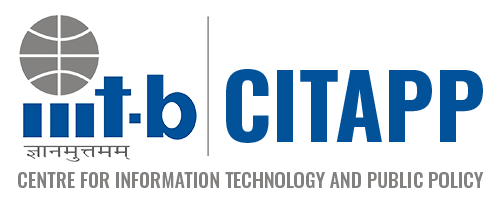Date: 9-12-2019 to 11-12-2019
Description: Towards an Ethical Digital Society: From Theory to Practice
A 3-day Winter School organized by the Centre for IT and Public Policy (CITAPP) at IIIT-Bangalore
9th – 11th December 2019
Concept
Since mid-twentieth century, technological innovation and change have been subjected to much public scrutiny, mostly in terms of their impact on and desirability for human societies. Starting from nuclear weapons to automobiles and from genetic engineering to artificial intelligence, serious ethical concerns such as environmental degradation, privacy violation and erosion of human agency have been raised. However, the relationship between technology and ethics is not always straightforward and is often intertwined with many other sociotechnical issues (Mitcham and Waelbers 2012). In more recent times, with ubiquitous presence of digital technologies in our lives accompanied by rapid technological changes, the relationship has become far more ambiguous, but yet more relevant, than ever before.
In simple terms, ethics is the study of what is right and wrong, good and bad. Ethics as a branch of philosophy that asks three sets of questions: why should we behave ethically (meta-ethics); how do we determine whether a particular action or course of action is ethical (normative ethics); and three, what are the implications of ethical positions in domains such as business, technology, medicine, politics, etc. (applied ethics). In addition to these concerns, anthropological notions of ethics focuses on moral subjects and their subjectivities (Fassin 2014). This means that our understanding of what is ethical differs across cultures and geographies as well as individual social positions (Applin 2014). For example, how to teach autonomous vehicles to follow local laws and norms; how to measure the impact of algorithms on marginal sections of the society; who should be held accountable when technologies fail?
Bringing together the philosophical and anthropological notions of ethics in the current context of technology, we can then ask:
• Can humans and technologies share the same moral codes?
• How do humans delegate responsibilities to technologies?
• How do we create technologies that accounts for diverse moral codes?
• How do we balance between human subjectivities and technological rationality?
Theme for 2019
This year’s Winter School ‘Towards an ethical digital society: from theory to practice’ presents a brief theoretical and practical toolkit for addressing some of the above questions in the context of technology design and implementation. We examine three kinds of technologies through a multidimensional lens of ethics: Artificial Intelligence, Digital Data and Digital Infrastructures. We look at these technologies as complex sociotechnical assemblages consisting of diverse actors, institutions and domains of practices and point out how different ethical considerations are relevant for each of these sociotechnical assemblages. The objective of the Winter School is to lay out a framework that helps the participants ask pertinent ethical questions that would inform the design and implementations of such technologies.
Programme Structure
The programme consists of lectures, interactive discussions, film screenings and group activities.
Tentative Topics:
• What is ethics? Why do we need to talk about ethics?
• Technology and Ethics: A multidimensional approach
• Digital Identity and Inclusion
• Smart City and Equity
• Data Justice
• Algorithmic Fairness
• Ethical AI
At the end of the three day programme, participants will present a poster on a specific aspect of Technology and Ethics discussed during the Winter School. The sessions will be conducted between 9 am and 5 pm every day. Detailed schedule of the programme will be available by end of November 2019.
Applications
Anybody with a Bachelor’s degree in any discipline may apply. Students who are in the final year of their Bachelor’s degree may also apply. Working professionals employed in the government, corporate and not-for-profit sectors are also encouraged to apply. There is no application fee. Selected candidates will have to register for attending the Winter School. Registration Fee for students and working professionals are Rs. 1000/ and Rs. 3000/- respectively. Registration fee will include a programme kit, lunch and refreshment for three days of the winter school. Outstation participants may be provided limited and partial travel allowance depending on availability of funds. To apply, please fill in the Application Form. Applications must be submitted by 10th November 2019. Accepted candidates will be notified by 17th November 2019
For further queries mail to: winterschool2019@iiitb.ac.in
